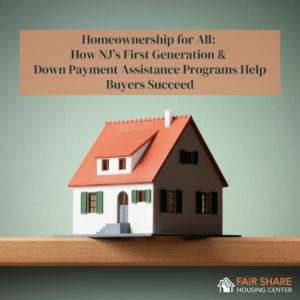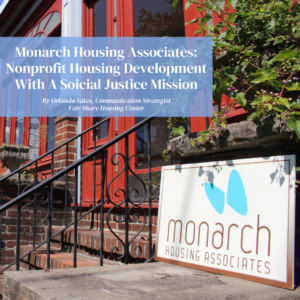Building Integrated Communities Through Public Housing Authorities and the Department of Community Affairs
May 15th, 2023
By David Rammler
A core value of Fair Share Housing Center’s work is integration because we see integration as the only means to bring about justice and equity for all. One component of federal housing law that can impact the level of integration in local communities is the Housing Choice Voucher (HCV) program of the federal Department of Housing and Urban Development (HUD). Public Housing Authorities that operate HCV programs can use vouchers to further integration through what is known as the Small Area Fair Market Rent program (SAFMR).
HUD’s HCV program, formerly known as Section 8, assists low-income households by paying landlords the amount by which the rent and utilities for a unit exceeds 30% of the household’s adjusted gross income. In other words, for housing to be deemed affordable, rent and utilities may only comprise 30% of a household’s adjusted gross income. When housing costs exceed that percentage, households may use a housing choice voucher managed by the Department of Community Affairs in those areas to pay the difference.
For decades, fair market rents (FMRs) were set as a percentage of the median income for the larger metropolitan area, or for the county, in which the residence was located. This meant, for instance, that Camden, New Jersey Fair Market Rents reflected the rental market comprised of Camden, Burlington and Gloucester counties in New Jersey and Philadelphia, Montgomery, Chester, and Delaware counties in Pennsylvania. While the FMR for a two bedroom across the expanse of those three counties may have been $1000, that far exceeded what a 2-bedroom apartment would cost in the city of Camden. This meant that landlords in areas with good schools, parks, access to good food and low crime would not accept a voucher because they knew they could get $1500 or $1800 for that same unit. It also meant that landlords in the center of Camden could get $1000 for a unit whose market value was only $500, thereby driving up the cost of rental in those low resourced neighborhoods and hurting all rental residents.
Public Housing Authorities and other operators of HCVs have had some flexibility to pay more or less than the FMR, but in practice, Public Housing Authorities opted to pay somewhat below FMR for units in less desirable neighborhoods and pay something very close to FMR in better neighborhoods in the hope of spreading their fixed amount of HCV funding over more households. Very rarely would voucher payments support the actual market rent in better off neighborhoods.
This historic voucher system perpetuates and deepens economic and racial segregation, fuels discrimination and enables and perpetuates distrust and fear. Further, as captured by the phrase zip code is destiny, it directly and dramatically harms individuals consigned to low-income and under resourced neighborhoods. Voucher users are forced to remain, or are driven into, existing low-income and under-resourced neighborhoods, meaning that they and their children are likely to have worse economic, educational, and health outcomes than residents who can choose and afford to move into better funded communities.
After decades of campaigning by tenants and tenant advocates, HUD finally agreed to formalize and greatly expand a program to tie FMRs to the prevailing rent in the neighborhood (zip code) in which the prospective housing is located. In 2017, HUD published the SAFMR Final Rule in the Federal Register. If a household is willing to navigate a new environment, the Public Housing Authority can support the transition financially by supplementing rent up to the FMR for the zip code in which the voucher holder wants to move, and through other supportive services.
SAFMRs are one component of HUD’s broad recognition that HCVs can help families move to better neighborhoods.
Having made the decision to actually affirmatively further fair housing through the HCV system, HUD moved a year later to mandate SAFMRs in specific areas. In 2018, HUD published a Public and Indian Housing Notice “provid[ing] guidance on the regulatory provisions implemented under the Small Area FMR (SAFMR) Final Rule.” Appendix A of the Notice identifies metropolitan areas where the use of SAFMRS is mandatory as of 2018. The list includes New Jersey HUD Metro Areas for Bergen-Passaic, Monmouth-Ocean, and Philadelphia-Camden-Wilmington. The Notice governs all housing authorities and agencies in those metropolitan areas, and, importantly, any of the 20,000+ vouchers issued by the New Jersey Department of Community Affairs (DCA) in those areas.
When SAFMRs became available, Fair Share Housing Center engaged with DCA staff in the hope that the state would, with the assistance of experienced advocates and housing authorities from other cities, develop a robust NJ SAFMR program. While some initial steps were taken, it is virtually impossible, from reasonably available public records, to determine whether or to what extent the program has been pursued or implemented. We encourage local tenant advocacy and integration organizations to consider investigating the commitment of their local Public Housing Authorities to further integration through SAFMR.






